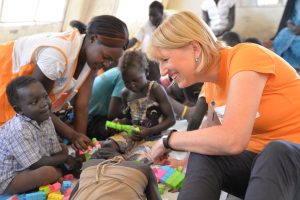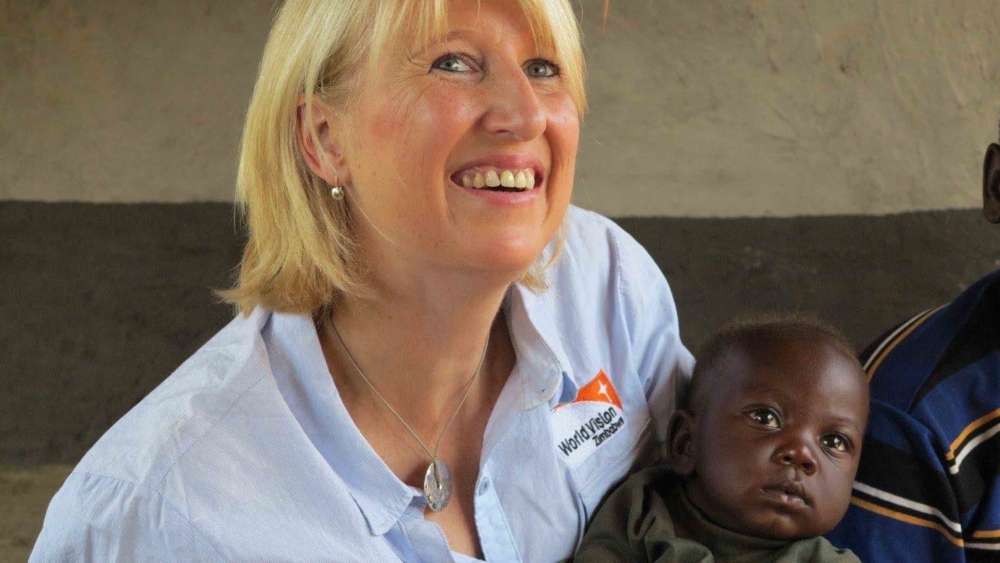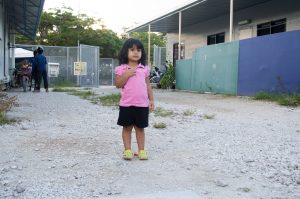'Nothing that can justify the imprisonment of innocent children'
World Vision’s Claire Rogers calls to get kids off Nauru at Tasmanian Prayer Breakfast
After launching the #KidsOffNauru campaign, World Vision CEO Claire Rogers flew to Tasmania to address the 11th Tasmanian Parliamentary Prayer Breakfast. This is an edited version of what she said.
I’ve thought a lot about privilege being a responsibility, not a right. I am a very privileged individual. I have loving parents. I am white. I am educated. I live in a nice suburb close to the city of Melbourne. I’ve had an interesting career and raised two children in safety. I’ve been protected and sheltered and I don’t have to face what 68 million displaced people are facing around the world right now.

Claire Rogers CEO – World Vision Australia
Most of us here today don’t know what it’s like to be on the run. We don’t know what it’s like to face trouble giving birth in a tent without a doctor on standby. I had birth difficulties. If I had been in that situation, I wouldn’t be here right now. My baby son and I would have died.
Most of us don’t know what it’s like to be forced into dangerous decisions that we don’t want to make. Like trusting the lives of our loved ones to a leaky boat and a people smuggler because if we stay at home we will be killed. I can tell you, if it came to protecting my family, I would do anything it took to save them. Put to the test, I suspect that’s true of most of us. In the words of Numa Touray, a 17-year-old refugee from Gambia: “I knew the journey would be dangerous, but if you have the lion behind you and the sea in front of you, you take the sea. I was 100 per cent certain to die at home … and thought I had a 50/50 chance to survive the sea.”
Equality, and the burning question
Do we really believe in equality? I am not talking here of intrinsic differences and ethnic distinctions; I am talking about the idea that every human being, made in the image of God, should be able to exercise the same rights and freedoms. If the answer to that is yes, we believe in the principle of equality, then how does this principle really shape our behaviours and policies? Because if displaced people are our inferiors in practice, we can’t then say with integrity they are our equals. This is simply a fact.
The goal is not to declare that we are “not sexist” or “not racist” or that we “believe in equality”. The burning question is: are we willing to use our privilege to ensure equality?
Our new reality – the world has to work together to solve global problems. Before coming to this role at World Vision, I was aware through my work in digital transformation that the 21st century has brought us all into the age of the global community. With more 75 billion devices coming online by 2020, we are more connected than ever before. What this new job is making me more aware of is the seismic nature of this new era of understanding ourselves and the planet.
Throughout most of human history, we have solved our problems locally. But now, global problems – terrorism, pandemics, refugees and displacement, climate change and poverty – require global solutions. We must work together.
We know this, but sometimes it’s hard to see how this is going to unfold especially in our current environment of a general backlash against globalism, with talk of religious freedoms being challenged, walls being built, aid budgets being cut, agreements being withdrawn from, detaining refugee children accepted and open hate speech against people of different faiths and backgrounds.
Like many Australians, I am used to thinking of us as a generous and outward looking nation, we are in the middle of a great test of our national character.
A fight I never expected to have in my own country – the Nauru story
On Monday this week I flew to Canberra and on behalf of World Vision launched an advocacy campaign, along with the Refugee Council of Australia, Oxfam and 30 other organisaitons so far, to get the children currently detained on Nauru resettled. We want to see the children and their families brought here, or resettled in a suitable third country that welcomes them, and where they can build a real future.
We’ve given our political leaders till Universal Children’s Day on November 20 to do something. And why have we started the clock? Because the children are suffering
We’ve given our political leaders till Universal Children’s Day on November 20 to do something. And why have we started the clock? Because the children are suffering.
Child rights is what World Vision is all about. As a child focused organisation, the issue of children in detention anywhere in the world is an ongoing concern for us … In my travels over the past two years I’ve seen firsthand how vulnerable children can be, especially in the fragile contexts where we work, places like Bangladesh or South Sudan. I have visited refugee camps in places like Uganda and Cox Bazar (Bangladesh) and met and talked with children and their parents, who’ve fled terrible violence and suffered great loss. A lot of our work in these camps consists of very basic child protection. We create safe spaces for children where they can simply play without fear for a few hours each day.
How can it be that Australia is harming children?
So it was very shocking for me to come home from visiting Bangladesh’s Cox Bazar earlier this year and soon after to realise that my own country was still actively and systemically denying children’s rights. It was a brave and determined Australian school teacher, Gabby Sutherland – who held up a photograph on Q&A taken that day of 124 children still being held on Nauru – that alerted me to this.
For some time now, the Government has been insisting that there are no longer any children in detention. Clearly the Government is relying on semantics because here was a photo of 124 children clearly still trapped on Nauru.
I haven’t been to Nauru. Few people have. But I have seen firsthand the plight of children growing up in refugee camps.
Hope is the universal gift that Jesus gave us – how we treat other human beings can give or take away hope. People, let alone children who are our future leaders, should not be left in limbo for prolonged periods. There’s no hope when there’s no end in sight!
There is actually nothing that can justify the imprisonment of innocent children. Anywhere. Anytime.
As CEO of World Vision Australia, I am leading our efforts to ensure the rights of children are recognised and upheld across the globe. The last place I had expected to have to wage this battle is in my own country.

You don’t need a fence to detain a child
Think about this. You remove a family’s liberty. You put them on a phosphate rock the size of Melbourne airport in a community that didn’t ask to have them. You tell them nothing about their future for five years or more. You refer to the family by their boat number so often that they refer to themselves by this too. You prohibit them from working for four years then change your mind and expect them to get a job in a community with only 12,000 people. You provide so little social and medical support that the parents become so depressed they can no longer look after their children – robbing them of their capacity to be their children’s desperately needed role models. In so doing you remove all hope from the family. All the while the children are watching their parents’ distress and that of other adults around them.
All they have known from a young age is a world of fences, security guards and uncertainty. They are witnesses to and sometimes a part of protests – they see desperate acts of self-harm, like lip stitching and even people setting themselves on fire. Some of the children choose to control the only thing they can – they refuse to eat, drink, talk and walk.
We have put these children in a psychological cave but there is no team of rescuers coming to save them – unlike the football team in Thailand.
We have put these children in a psychological cave but there is no team of rescuers coming to save them – unlike the football team in Thailand.
It’s time for the Australian Parliament to assemble the rescue team.
The Australian Parliament has found outcomes for thousands of refugees so far – and we applaud that. But these children have, through no fault of their own, drawn the short straw to be in the last cohorts.
They are unfairly being used as a deterrent. Forty of them have never known another life – they were born in detention.
Every day this is not resolved, more damage is being done. Rehabilitation is urgent. If we don’t take action there may be a child who dies.
We call Nauru “a refugee processing centre” – but there is no processing going on or, at best, it’s vastly inadequate. The number of children on Nauru is reducing, but only for the worst possible reasons – a 10-year-old’s repeated attempts to commit suicide, a teenage girl’s refusal to talk, eat, drink, walk and open her eyes, needing a gastric tube to survive (resignation syndrome). A very ill toddler sent first to Port Moresby to sustain our commitment that none of these particular refugees ever come to Australia, which was then overruled in the courts. Just yesterday another child was medi-evacuated.
Why the Nauru campaign now?
We have been embroiled in a toxic debate on refugees since the Tampa crisis in 2001. Our domestic rhetoric has demonised asylum seekers. In recent years the Australian Government has refused to budge on the fate of these refugees. What has become of our moral compass, that we should treat the most vulnerable among us, our children, in this way and consider it acceptable? I keep thinking that someone is going to be apologising for this in 20 years’ time but it will be too late for these kids, we need to get them off, now!
These children are also being forced to grow up without the very basics that Australian parents consider necessities for their own sons and daughters — like a decent education.
Only 15% are believed to be attending school. They are growing up without grandparents, aunts and uncles, cousins and in some cases siblings.
So we decided to see if we could do something – more than just an article, something that could be a real game changer for the forgotten children of Nauru. And because this is bigger than World Vision and because we believe that most Australians would agree that children shouldn’t be left to suffer and languish on an island prison, we decided to approach others in the sector.
#KidsOffNauru is really a campaign for and by all decent Australians who are heart-broken that we are denying these children their most fundamental rights; their freedom and their future.
So #KidsOffNauru is really a campaign for and by all decent Australians who are heart-broken that we are denying these children their most fundamental rights; their freedom and their future. As a former banker, I am a very practical person – actions speak louder than words. If our principles, like equality, like justice, like freedom, do not have the power or the agency to shape our policies and practices then what do they mean?
Nothing.
We must find a humane solution to this, if our principles mean anything at all. We are a clever and creative country. If we want to, we can do this. Using our freedom and privilege to do good.
Veteran Christian social commentator, Os Guinness, believes that free societies like ours are rare and fleeting. He says that if you pack all of human history into an hour, free societies make a guest appearance for about 5 minutes and because we’ve known freedom, we think it will always be here – we don’t take seriously enough the need to protect it.
Guinness argues that the freedom we know and understand in the West is grounded in Christian values and with the exit of these Christian values from our institutions, we are putting our freedom at risk. We are becoming what he calls a ‘cut flower’ civilisation. Cut flowers in a vase don’t last like flowers rooted in the soil.
Historically speaking, nations corrupt their customs when they’re at the pinnacle of power, or the height of prosperity – just like we are now. Why? Because people grow complacent.
What are the Christian values we are talking about?
The foundation for free will and moral equality that underpins our society is laid out in the New Testament. They were taught by Jesus Christ and developed in the writings of Paul, such as the central Christian teaching that regardless of apparent worldly inequalities, we are equal in the eyes of God.
As Paul explained in Galatians: “There is neither Jew nor Greek, there is neither slave nor fee, there is neither male nor female, for you are all one in Christ Jesus.” (3:28)
And church leaders meant it. Christianity began in a world where almost half the population was in bondage. By the seventh century, Christianity was the only major world religion that was theologically opposed to slavery. In the 18th Century, Christian leaders like William Wilberforce and others led the abolition movement.
This is a profound example of where privilege spoke of equality but did not live it – until Wilberforce had the courage to stand up against conventional thinking. These values of free will and equality are so deep in our culture that we take them for granted. But we must defend freedom in practice, or else it can disintegrate into mere hedonism, licentiousness and complacency.
In this beautiful, messy, tumultuous world that we share with the poorest and the richest, I call on you to live out the calling of Christ.
In this beautiful, messy, tumultuous world that we share with the poorest and the richest, I call on you to live out the calling of Christ. To accept the restorative power of Jesus’ gift of equality to all, and to do three things:
1. Reflect deeply on your privilege and where you might be inadvertently creating unjust outcomes.
2. Remember that our freedom comes in part from our privilege and needs to be defended – how will you ensure that equitable freedom and grace for all will be protected in your spheres of influence?
3. To join with me in using our privilege to challenge the powers that be, to ensure the health and well-being of these suffering children please visit www.kidsoffnauru.com to see what you can do.
This speech was originally delivered at the 11th Tasmanian Parliamentary Prayer Breakfast at Hobart’s Hotel Grand Chancellor on Wednesday 18 August 2018.



